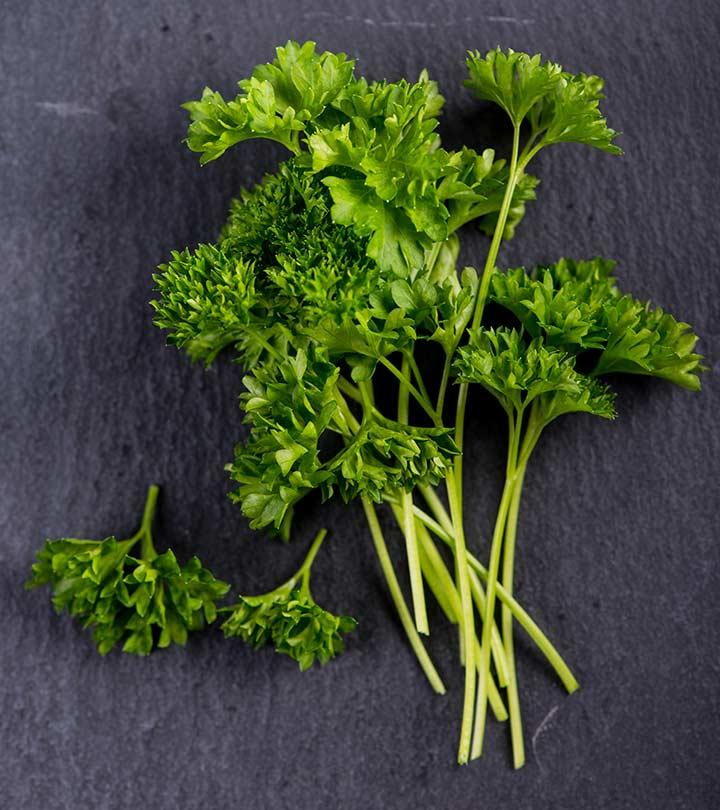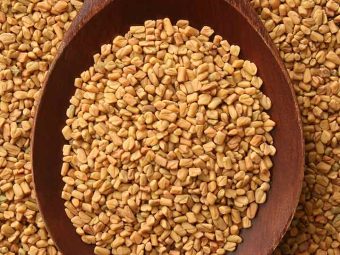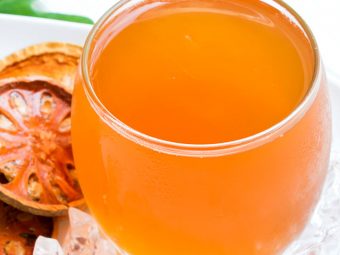Parsley: 10 Potential Benefits And Uses, Nutrition, How To Make Tea
Loaded with powerful antioxidants, this delicious herb is a must-have in your daily diet.

The immense health benefits of parsley have made it a popular choice among seasonings. It is a medicinal and culinary herb indigenous to the Mediterranean and used throughout history. Many recipes call for the herb’s stems, leaves, and seeds.
As per anecdotal reports, parsley may help lower blood pressure, cholesterol levels, and allergy symptoms. This ingredient is used in making soaps, creams, and perfumes (1). In addition, parsley has antimicrobial and anti-inflammatory properties beneficial to the skin.
This article discusses the benefits of parsley, its types, its nutritional profile, easy-to-follow recipes, how to use it, and any potential side effects. Take a look.
In This Article
What Is the Nutritional Profile of Parsley
Half a cup (30 g) of fresh, chopped parsley provides 11 calories, 2 grams of carbs, 1 gram of protein, 1 gram of fat, and 1 gram of fiber (2).
- It is a rich source of vitamin A (8424 IU), vitamin C (133 mg), vitamin K (1640 µg), folic acid (152 µg ), and potassium (554 mg) (2).
- Parsley also contains flavonoids, carotenoids, and vitamin C that have antioxidant properties (2).
In the following section, we will look at the health benefits of parsley.
What Are The Health Benefits Of Parsley?
1. May Regulate Blood Sugar Levels
Parsley and its essential oil are rich in an antioxidant called myristicin (3). Myristicin may help regulate blood sugar levels. It may also lower insulin resistance and inflammation. However, more research is needed to understand these effects.
2. May Aid Kidney Health
Parsley is a natural diuretic (4). It may help remove toxins and germs from the body. Rats fed with parsley seed extract showed more urine output than when they were drinking just water (4). Parsley may inhibit the sodium potassium pump that is involved in the urine regulation in kidneys (4).
Animal studies further suggest that parsley has nephroprotective effects on rats with renal issues (5).
3. May Have Anti-Cancer Effects
Parsley is rich in flavonoids that are known to have anti-cancer properties. The flavonoids inhibit cell growth and reduce oxidative stress (6).
Animal research has found that apigenin, a flavonoid found in parsley seeds, could help in killing cancer cells and decreasing the size of the tumors (7).
Studies on cancer cell lines have also found apigenin to exhibit anti-proliferation, anti-inflammation, and anti-metastasis properties in colorectal cancer (8). Apigenin is found to have anti-carcinogenic effects on breast cancer (9).
Another anti-carcinogenic flavonoid found in parsley is luteolin (10), (11). Research has stated that luteolin may have preventive effects on colorectal cancer (10).
Parsley also contains carnosol, another compound with promising results in treating cancers of the breast, skin, colon, and prostate (12).
4. May Improve Heart Health
Parsley has been used in folk medicine to help treat hypertension. The rich flavonoid content in parsley helps in improving heart health and reducing the risk of cardiovascular diseases (13).
Parsley is also a good source of folic acid. Folate intake is associated with good heart health (14). Low levels in folate can be harmful for the heart (15). Hence, including parsley in one’s diet can be helpful in this regard.
5. May Support Bone Health
Parsley is a good source of vitamin K. The vitamin helps in the formation of bone cells called osteocytes (16). Parsley was found to inhibit bone resorption (a process where bones and absorbed and broken down by the body) in rats (17).
6. May Help In Digestion
Traditionally, parsley is used to help treat digestive and gastrointestinal disorders. The fiber content in parsley helps in digestion (18). It helps in moving the food in the digestive tract and also acts as a prebiotic fodder for the good bacteria in the gut.
Parsley extracts were found to have an anti-ulcer effect in mice studies. They achieved this by inhibiting the excess secretion of gastric juice (19).
7. May Boost Immunity
Parsley contains many antioxidants and anti-inflammatory compounds, including flavonoids (20). Apigenin fights inflammation in the body (21).
Parsley also contains vitamin C. The nutrient is a potent antioxidant that boosts the immune system (22). Parsley contains flavonols, such as kaempferol and quercetin, that fight oxidative stress and cellular damage (23).
8. May Enhance Liver Health
Parsley could regulate cholesterol and have a protective effect on the liver of rats (24). Other studies have found that parsley can help in the regeneration of liver cells and regulate enzymes in the liver in mice with diabetes (25).
9. Has Antibacterial Properties
Parsley has traditionally been used for its ability to fight germs. In a study, parsley showed antimicrobial activity in kareish cheese (26).
The essential oil from parsley has exhibited both antibacterial and antifungal activity (27). It could inhibit the growth of bacteria such as Staphylococcus aureus and Listeria monocytogenes (27). It could also protect against the fungi Penicillium ochrochloron and Trichoderma viride (27).
10. May Help Protect The Eyes
Parsley contains vitamin A, a nutrient that can help in improving eye health (28). Parsley also contains carotenes, such as lutein and zeaxanthin, that help in protecting the eyes (29). These pigmented antioxidants help in keeping the eyes healthy by preventing oxidative damage. They reduce the risk of macular degeneration and cataracts (29).
These are the health benefits of parsley. The herb is also known to promote skin health. In the following section, we have covered this topic exclusively.
What Are The Benefits Of Parsley For Skin?
- Nutrient-rich: Parsley is rich in nutrients, such as copper, zinc, manganese, calcium, and potassium, that are essential for healthy skin.
- Anti-Aging: The vitamin C in parsley helps in slowing down aging. It works by fighting free radicals that cause oxidative stress (30). The nutrient also helps reduce fine lines and wrinkles. It helps in cell repair and stimulates collagen production (30). This helps the skin look supple and young.
- Anti-acne: The antimicrobial properties in parsley may help in fighting bacteria and reducing acne (27). Parsley may also balance out excess sebum. However, there are no studies to support this claim.
- Anti-inflammatory: Parsley contains antioxidants that may help in reducing irritation and redness of the skin.
- Evens Skin Tone And Reduces Pigmentation: The vitamin C in the herb can brighten the skin and reduce uneven spots. Vitamin C may also help reduce hyperpigmentation.
Parsley can be used for skin health. Here, we have listed down a few recipes using parsley that you can use on your skin.
Facial Toner To Fight Acne
You Will Need
- Distilled water
- Parsley leaves
- A few drops of lemon juice
- 3 drops of tea tree oil
- 3 drops of rosemary extracts
Process
- Add parsley leaves to boiling water.
- After it cools down, add a few drops of lemon juice, tea tree oil, and rosemary extracts.
- Pour this mixture in a bottle and use it as a toner.
Facial Cleanser For Even Skin Tone
You Will Need
- Distilled water
- Parsley leaves
- A few drops of lemon juice
- 1 teaspoon of honey
Process
- Soak parsley in warm water.
- Make a fine paste and add one teaspoon of honey and few drops of lemon juice.
- This face cleanser will lighten spots and remove dead cells, leading to soft, glowing skin.
Face Pack For Skin Brightening
You Will Need
- 1 tablespoon of yogurt
- Parsley leaves
- A few drops of tea tree oil
- 1 tablespoon of oatmeal
Process
- Add a few parsley leaves to one tablespoon of yogurt.
- Add one tablespoon of oatmeal to this mixture and make a fine paste.
- You can add a few drops of tea tree oil to this mixture and apply this face mask for a clear, healthy skin.
Tonic For Healthy skin
You Will Need
- Distilled water
- Parsley leaves
Process
- Extract the juice from the leaves and mix it with 200 ml of water.
- Consume this concoction daily to get healthy skin. Avoid excess consumption.
These are the ways you can use parsley to promote skin health. We have seen the many benefits of parsley. What about taking a peek into its history?
What Is The History Of Parsley?
Parsley was held in high regard by the Greeks. It was used to honor athletes who won. It was also used to decorate the tombs. It found its use in medicine before Romans introduced it to garnish food. It has been cultivated for over 2000 years now. Today, parsley is available in different types.
What Are The Different Types Of Parsley
- Curled leaf or common parsley is often used as a garnish in soups, stews, and other dishes. It has a crunchy texture.
- Flat leaf parsley or Italian parsley has a stronger flavor than the curled leaf parsley. It is also used in salads, stews, soups, and sauces as a garnish.
- Hamburg or German parsley is one type whose turnip-shaped root is used instead of its leaves. The root can be fried or used in stews and soups for flavor.
In the following section, we will explore how to use parsley for cooking.
How To Use Parsley For Cooking
Parsley is a versatile and cheap flavoring option to elevate the taste and presentation of any dish. It is commonly used in stews and soups. Many salad dressings and marinades use fresh parsley. The aroma enhances the whole culinary experience. Both fresh and dried parsley can be used for cooking.
French cuisine incorporates parsley in stock and soup, while Middle Eastern dishes, such as hummus and baba ghanoush, use parsley as garnish.
Italian foods, such as pasta, spaghetti, pizza or lasagna, use dried parsley as a flavoring ingredient. Sauces, such as pesto or salsa, also include parsley. It is generally added at the end of the cooking process to retain the flavor of the dish.
How To Include Parsley In Your Diet
Discard the stems and chop the parsley leaves. These can be used in potato salad or tomato-based sauces. You can also add it to your omelet. You can include parsley juice in your smoothie for a fresh taste.
You can also check the following recipes and include the herb in your diet.
Parsley Recipes
- Parsley Tea
What You Need
- 250 ml of purified water
- ¼ cup of fresh parsley leaves
Process
- Bring the purified water to a boil using a tea kettle.
- Rinse the fresh parsley leaves under cool, running water.
- Steep the leaves in the boiling water for about 10 minutes.
- Strain the leaves and enjoy.
- Almond-Crusted Salmon
What You Need
- ½ cup of almonds
- 2 tablespoons of parsley
- 1 teaspoon each of sea salt and ground black pepper
- 1 tablespoon of grated organic lemon zest
- 4 salmon fillets
- 2 tablespoons of avocado oil
- 4 cups of spinach
Process
- Grind the almonds in a food processor.
- On a plate, mix the almond powder with parsley, lemon zest, salt, and pepper.
- Dredge the salmon in the almond mixture on both the sides.
- Heat the oil on a large skillet over medium heat. Add the salmon and cook for about 5 minutes on each side.
- Serve topped with lemon juice.
Before you start cooking with parsley, you may want to pick the right parsley and store it properly.
How To Select And Store Parsley
Selection
Parsley is available all round the year in supermarkets. Look for fresh parsley that has firm stems. Try to buy organically sourced parsley. Avoid buying parsley with wilted or yellow leaves, mold, and dark spots.
Storage
Parsley has to be stored properly. If not, it can wilt and lose its flavor. Store parsley in a dark spot, away from sunlight. Remove any yellow or dirty wilted leaves and wash the leaves thoroughly. Drain the excess water on a kitchen towel. Repeat the washing process again and then shake excess water off the leaves. Lay them on a kitchen towel and gently dab them to remove the remaining water. Place the leaves in a ziploc bag and store it in the refrigerator. It can last fresh for around 10 days. You can store parsley for a longer time by keeping the stems standing in water. You have to change the water to prevent microbial contamination.
Parsley may cause certain adverse effects in some people. You may want to check them out before including the herb in your diet.
Risks And Side Effects Of Parsley
Parsley should be consumed in moderation. It can lead to allergies in certain cases if consumed in excess. The following are the side effects.
- May Interfere With Blood Pressure
Parsley can regulate blood pressure by moderating the sodium potassium pumps. However, when consumed in higher amounts, it may interact with medications for hypertension (31). Consult a doctor if you observe any changes in your blood pressure levels.
- May Cause Hypoglycemia
The myristicin in parsley may lower blood sugar levels. If you are already on medications for lower blood sugar, taking excess parsley may lead to hypoglycemia (excessively low blood sugar levels).
- Interactions During Surgery
Parsley may prevent blood clotting and prolong bleeding time (32). Hence, it may cause excessive bleeding during surgery. Avoid parsley at least two weeks before a scheduled surgery.
- Skin Sensitivity
Certain individuals develop sensitivity to sun after topical application of parsley or parsley seed oil (33). This can cause sunburns and rashes. Hence, check with your doctor before use.
- Kidney Disease
Although parsley is beneficial for the kidneys, it may cause adverse reactions in individuals with kidney disease. However, research is lacking in this aspect. Hence, consult your doctor.
- Issues Regarding Pregnancy And Breastfeeding
Though it is safe in normal amounts, excess intake of parsley during pregnancy or breastfeeding may cause complications. Parsley may reduce milk production (34). Hence, it may not be advisable to take it during lactation.
- Other Drug Interactions
Parsley has large amounts of vitamin K, which is involved in blood clotting. The herb may interact with medications used for preventing blood clotting (32). Some studies consider interaction between parsley and warfarin (an anti-coagulant) as doubtful (35).
The benefits of parsley make it an ideal choice for seasonings. It is rich in vitamins A, C, and K, potassium, and folate. Parsley enhances kidney, heart, bone, liver, and eye health. It also has antibacterial properties and boosts immunity. It is also known for its anti-aging, anti-acne, and anti-inflammatory properties. However, high doses can interact with blood pressure medicines, cause hypoglycemia, and aggravate kidney disease. Hence, caution is advised. You can include this as a regular seasoning or try out any of the recipes mentioned above to reap the benefits of parsley.
Frequently Asked Questions
Can parsley help you lose weight?
Anecdotal evidence suggests that parsley could be used in detox and weight loss drinks. However, there is no scientific evidence that shows parsley is good for weight loss.
What happens when you eat too much parsley?
Parsley is recognized as safe (GRAS) by the U.S. Food and Drug Administration. However, since it is a diuretic, it is not recommended you consume too much of it. The herb may also cause skin allergies.
How much parsley should I eat per day?
There is no scientific data on the ideal dosage of parsley per day. You can take it in normal food amounts.
Is eating raw parsley good for you?
Yes, raw parsley is rich in nutrients and is beneficial for your health. However, it must be washed properly before consumption.
Is it safe to drink parsley tea every day?
Yes, it is safe to drink parsley tea every day. However, limit your intake to 1 to 2 cups per day. If you are on any medications, check with your doctor before consuming parsley/parsley tea.
Sources
- Mahmood, Sidra, Shahzad Hussain, and Farnaz Malik. “Critique of medicinal conspicuousness of Parsley (Petroselinum crispum): a culinary herb of Mediterranean region.” Pak J Pharm Sci 27.1 (2014): 193-202.
https://www.ncbi.nlm.nih.gov/pubmed/24374449 - FoodData Central, Usda.Gov, 2020, fdc.nal.usda.gov/fdc-app.html#/?query=parsley. Accessed 25 Feb. 2020.https://fdc.nal.usda.gov/fdc-app.html#/?query=parsley
- Zhang, Hui, et al. “Evaluation of antioxidant activity of parsley (Petroselinum crispum) essential oil and identification of its antioxidant constituents.” Food Research International39.8 (2006): 833-839.
https://www.sciencedirect.com/science/article/abs/pii/S0963996906000615 - Kreydiyyeh, Sawsan Ibrahim, and Julnar Usta. “Diuretic effect and mechanism of action of parsley.” Journal of ethnopharmacology79.3 (2002): 353-357.
https://www.sciencedirect.com/science/article/abs/pii/S0378874101004081 - Shalaby, M. A., and A. A. Hammoda. “Evaluation of nephroprotective and diuretic effects of parsley and turmeric herbs on gentamicin nephrotoxic rats.” World Journal of Pharmacy and Pharmaceutical Sciences (WJPPS)3.12 (2014): 1729-1744.
https://www.semanticscholar.org/paper/EVALUATION-OF-NEPHROPROTECTIVE-AND-DIURETIC-EFFECTS-Acy/40699f10cd55ab7239978dd70dc2682e05742a80 - Raffa, Demetrio, et al. “Recent discoveries of anticancer flavonoids.” European journal of medicinal chemistry 142 (2017): 213-228.
https://www.sciencedirect.com/science/article/abs/pii/S0223523417305561 - Alol, Layla Hashim, Kahtan Ahmed Al-Mzaien, and Shalal Murad Hussein. “The promising anticancer efficacy of parsley seeds flavonoid (apigenin) in induced mammary adenocarcinoma (AMN3) mice.” J. Physiol. Biomed. Sci25.1 (2012): 5-12.
https://www.researchgate.net/publication/319122364_The_Promising_Anticancer_Efficacy_of_Parsley_Seeds_Favonoid_Apigenin_in_Induced_Mammary_Adenocarcinoma_AMN3_Mice - Dai, Jin, et al. “Downregulation of NEDD9 by apigenin suppresses migration, invasion, and metastasis of colorectal cancer cells.” Toxicology and applied pharmacology311 (2016): 106-112.
https://www.ncbi.nlm.nih.gov/pmc/articles/PMC5759047/ - Mohammad Nabavi, Seyed, et al. “Apigenin and breast cancers: from chemistry to medicine.” Anti-Cancer Agents in Medicinal Chemistry (Formerly Current Medicinal Chemistry-Anti-Cancer Agents)15.6 (2015): 728-735.
https://pubmed.ncbi.nlm.nih.gov/25738871/ - Pandurangan, Ashok Kumar, and Norhaizan Mohd Esa. “Luteolin, a bioflavonoid inhibits colorectal cancer through modulation of multiple signaling pathways: a review.” Asian Pac J Cancer Prev15.14 (2014): 5501-5508.
https://pubmed.ncbi.nlm.nih.gov/25081655 - Lin, Yong, et al. “Luteolin, a flavonoid with potential for cancer prevention and therapy.” Current cancer drug targets8.7 (2008): 634-646.
https://www.ncbi.nlm.nih.gov/pmc/articles/PMC2615542/ - Johnson, Jeremy J. “Carnosol: a promising anti-cancer and anti-inflammatory agent.” Cancer letters305.1 (2011): 1-7.
https://www.sciencedirect.com/science/article/abs/pii/S030438351100067X - Wang, Xia, et al. “Flavonoid intake and risk of CVD: a systematic review and meta-analysis of prospective cohort studies.” British Journal of Nutrition111.1 (2014): 1-11.
https://pubmed.ncbi.nlm.nih.gov/23953879 - Cui, Renzhe, et al. “Dietary folate and vitamin b6 and B12 intake in relation to mortality from cardiovascular diseases: Japan collaborative cohort study.” Stroke41.6 (2010): 1285-1289.
https://pubmed.ncbi.nlm.nih.gov/20395608 - Voutilainen, Sari, et al. “Low dietary folate intake is associated with an excess incidence of acute coronary events: The Kuopio Ischemic Heart Disease Risk Factor Study.” Circulation103.22 (2001): 2674-2680.
https://pubmed.ncbi.nlm.nih.gov/11390336 - DiNicolantonio, James J., Jaikrit Bhutani, and James H. O’Keefe. “The health benefits of vitamin K.” Open heart2.1 (2015): e000300.
https://pubmed.ncbi.nlm.nih.gov/26468402 - Putnam, Sophie E., et al. “Natural products as alternative treatments for metabolic bone disorders and for maintenance of bone health.” Phytotherapy Research: An International Journal Devoted to Pharmacological and Toxicological Evaluation of Natural Product Derivatives21.2 (2007): 99-112.
https://pubmed.ncbi.nlm.nih.gov/17106868 - Capuano, Edoardo. “The behavior of dietary fiber in the gastrointestinal tract determines its physiological effect.” Critical reviews in food science and nutrition57.16 (2017): 3543-3564.
https://www.ncbi.nlm.nih.gov/pubmed/27229126 - Al-Howiriny, Tawfeq, et al. “Prevention of experimentally-induced gastric ulcers in rats by an ethanolic extract of” Parsley” Petroselinum crispum.” The American journal of Chinese medicine31.05 (2003): 699-711.
https://pubmed.ncbi.nlm.nih.gov/14696673 - Panche, A. N., A. D. Diwan, and S. R. Chandra. “Flavonoids: an overview.” Journal of nutritional science5 (2016).
https://www.ncbi.nlm.nih.gov/pmc/articles/PMC5465813/ - Lim, Ratana, et al. “Dietary phytophenols curcumin, naringenin and apigenin reduce infection-induced inflammatory and contractile pathways in human placenta, foetal membranes and myometrium.” Molecular human reproduction19.7 (2013): 451-462.
https://pubmed.ncbi.nlm.nih.gov/23475986 - Carr, Anitra C., and Silvia Maggini. “Vitamin C and immune function.” Nutrients9.11 (2017): 1211.
https://www.ncbi.nlm.nih.gov/pubmed/29099763 - Haidari, Fatemeh, et al. “Effects of parsley (Petroselinum crispum) and its flavonol constituents, kaempferol and quercetin, on serum uric acid levels, biomarkers of oxidative stress and liver xanthine oxidoreductase aactivity inoxonate-induced hyperuricemic rats.” Iranian journal of pharmaceutical research: IJPR10.4 (2011): 811.
https://www.ncbi.nlm.nih.gov/pmc/articles/PMC3813066/ - Soliman, Hanan A., et al. “Hepatoprotective effects of parsley, basil, and chicory aqueous extracts against dexamethasone-induced in experimental rats.” Journal of intercultural ethnopharmacology5.1 (2016): 65.
https://www.ncbi.nlm.nih.gov/pmc/articles/PMC4805149/ - Bolkent, Sehnaz, et al. “Effects of parsley (Petroselinum crispum) on the liver of diabetic rats: a morphological and biochemical study.” Phytotherapy Research18.12 (2004): 996-999.
https://pubmed.ncbi.nlm.nih.gov/15742348 - Wahba, Nahed M., Amany S. Ahmed, and Zedan Z. Ebraheim. “Antimicrobial effects of pepper, parsley, and dill and their roles in the microbiological quality enhancement of traditional Egyptian Kareish cheese.” Foodborne pathogens and disease7.4 (2010): 411-418.
https://www.ncbi.nlm.nih.gov/pubmed/19919287 - Linde, G. A., et al. “Antifungal and antibacterial activities of Petroselinum crispum essential oil.” Genetics and Molecular Research15.3 (2016).
https://pubmed.ncbi.nlm.nih.gov/27525894/ - Saari, John C. “Vitamin A and vision.” The Biochemistry of Retinoid Signaling II. Springer, Dordrecht, 2016. 231-259.
https://pubmed.ncbi.nlm.nih.gov/27830507 - Abdel-Aal, El-Sayed M., et al. “Dietary sources of lutein and zeaxanthin carotenoids and their role in eye health.” Nutrients5.4 (2013): 1169-1185.
https://www.ncbi.nlm.nih.gov/pubmed/23571649 - Pullar, Juliet M., Anitra C. Carr, and Margreet Vissers. “The roles of vitamin C in skin health.” Nutrients9.8 (2017): 866.
https://www.ncbi.nlm.nih.gov/pmc/articles/PMC5579659/ - Bahar, Zuhal, et al. “Herbal Therapies Used by Hypertensive Patients in Turkey.” African Journal of Traditional, Complementary, and Alternative Medicines, vol. 10, no. 2, 31 Dec. 2012, pp. 292–298
https://www.ncbi.nlm.nih.gov/pmc/articles/PMC3746576/ - Gadi, Dounia, et al. “Parsley extract inhibits in vitro and ex vivo platelet aggregation and prolongs bleeding time in rats.” Journal of ethnopharmacology125.1 (2009): 170-174.
https://pubmed.ncbi.nlm.nih.gov/19467310/ - Smith, D. M. “Occupational photodermatitis from parsley.” The Practitioner229.1405 (1985): 673-675.
https://www.researchgate.net/publication/19126421_Occupational_photodermatitis_from_parsley - Kabiri, Marya, et al. “Management of breast milk oversupply in traditional Persian medicine.” Journal of evidence-based complementary & alternative medicine22.4 (2017): 1044-1050.
https://www.ncbi.nlm.nih.gov/pmc/articles/PMC5871304/ - Ge, Beikang, Zhen Zhang, and Zhong Zuo. “Updates on the clinical evidenced herb-warfarin interactions.” Evidence-Based Complementary and Alternative Medicine2014 (2014).
https://www.ncbi.nlm.nih.gov/pmc/articles/PMC3976951/













